Tag Archives: Governor Janet Mills
Maine leaders split on environmental regulation ruling by US Supreme Court
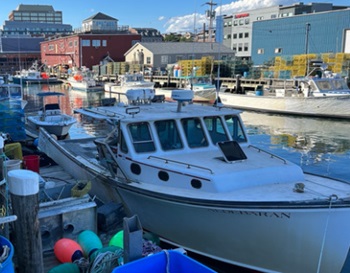 By a vote of 6-3, the Supreme Court overturned the Chevron v. Natural Resources Defense Council ruling from 1984. Governor Janet Mills shared concerns that this decision could impact how federal agencies protect the health and safety of Americans. Maine House Minority Leader Billy Bob Faulkingham, also a lobster fisherman, says this could help in their fight against federal fishing regulations. “This really opens up a whole new avenue for people that feel like they’ve been hurt by the government to challenge that,” Faulkingham said. 5 photos, >>CLICK TO READ<< 09:08
By a vote of 6-3, the Supreme Court overturned the Chevron v. Natural Resources Defense Council ruling from 1984. Governor Janet Mills shared concerns that this decision could impact how federal agencies protect the health and safety of Americans. Maine House Minority Leader Billy Bob Faulkingham, also a lobster fisherman, says this could help in their fight against federal fishing regulations. “This really opens up a whole new avenue for people that feel like they’ve been hurt by the government to challenge that,” Faulkingham said. 5 photos, >>CLICK TO READ<< 09:08
Governor Mills Directs Administration to Prepare to Distribute $60 Million in Storm Relief as Soon as Funding Becomes Available
 Governor Janet Mills today directed her Administration to take the steps necessary to distribute the $60 million in storm relief as soon as the money becomes statutorily available. $50 million of the funding will be distributed in grants by the Maine Department of Transportation through the Maine Infrastructure Adaptation Fund, which was created by the Mills Administration and the Legislature in 2021. $10 million in funding, added by the Legislature to the Governor’s original proposal, will be distributed to small businesses by the Department of Economic and Community Development through the Business Resilience and Recovery Fund. more, >>CLICK TO READ<< 14:30
Governor Janet Mills today directed her Administration to take the steps necessary to distribute the $60 million in storm relief as soon as the money becomes statutorily available. $50 million of the funding will be distributed in grants by the Maine Department of Transportation through the Maine Infrastructure Adaptation Fund, which was created by the Mills Administration and the Legislature in 2021. $10 million in funding, added by the Legislature to the Governor’s original proposal, will be distributed to small businesses by the Department of Economic and Community Development through the Business Resilience and Recovery Fund. more, >>CLICK TO READ<< 14:30
Commercial fisheries landings increased more than $25 million in value in 2023
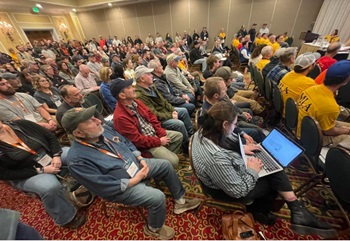 Preliminary numbers for commercial seafood landings in 2023 released today show a strong year for the industry, with commercial fishermen earning $611,277,692 — an increase of $25 million — for 204,684,775 pounds of seafood brought in to state docks. Despite a warming Gulf of Maine, intense storms and the damage to working waterfronts and lower lobster landings, “the Maine seafood industry continues to be a powerful economic engine for our state,” said Governor Janet Mills. Statewide, 93,734,116 pounds of lobsters landed on docks for a $461,371,720 value, an increase of about $72 million. The value represents what is paid at the docks to fishermen, dollars that flow throughout local communities and the state’s overall economy. Stonington is the top port for commercial seafood value this year, bringing in $47.37 million of value, and the second port, behind Portland, for pounds — 13.98 million. more, >>click to read<< 12:54
Preliminary numbers for commercial seafood landings in 2023 released today show a strong year for the industry, with commercial fishermen earning $611,277,692 — an increase of $25 million — for 204,684,775 pounds of seafood brought in to state docks. Despite a warming Gulf of Maine, intense storms and the damage to working waterfronts and lower lobster landings, “the Maine seafood industry continues to be a powerful economic engine for our state,” said Governor Janet Mills. Statewide, 93,734,116 pounds of lobsters landed on docks for a $461,371,720 value, an increase of about $72 million. The value represents what is paid at the docks to fishermen, dollars that flow throughout local communities and the state’s overall economy. Stonington is the top port for commercial seafood value this year, bringing in $47.37 million of value, and the second port, behind Portland, for pounds — 13.98 million. more, >>click to read<< 12:54
Maine fishermen hope for relief after powerful storm damages wharfs, equipment
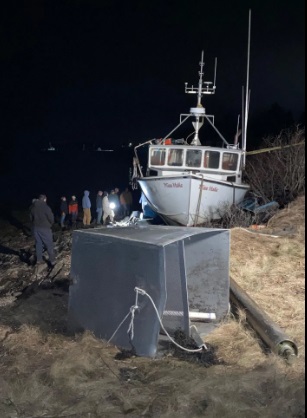 Much of Coastal Maine is now in a State of Civil Emergency after this week’s storm caused widespread damage up and down the coast. That announcement by Governor Janet Mills will mobilize resources for recovery but might also provide a bit of extra relief for Maine fisherman. Fisherman were hard hit by the storm. That damage is illustrated in Harpswell, where a lobsterman’s boat was washed up against the shore during Wednesday’s high tide. Thursday, fishermen in Harpswell were trying to secure and fix it before the boat would get hit by more winds and waves from Saturday’s storm. Video, photos, more,>>click to read<< 09:15
Much of Coastal Maine is now in a State of Civil Emergency after this week’s storm caused widespread damage up and down the coast. That announcement by Governor Janet Mills will mobilize resources for recovery but might also provide a bit of extra relief for Maine fisherman. Fisherman were hard hit by the storm. That damage is illustrated in Harpswell, where a lobsterman’s boat was washed up against the shore during Wednesday’s high tide. Thursday, fishermen in Harpswell were trying to secure and fix it before the boat would get hit by more winds and waves from Saturday’s storm. Video, photos, more,>>click to read<< 09:15
Maine DMR Receives $17 Million to Support Maine’s Lobster Industry, Improve Flawed Right Whale Data
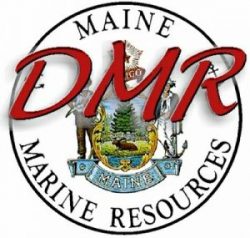 Governor Janet Mills and Department of Marine Resources (DMR) Commissioner Patrick Keliher today announced that Maine has received $17,252,551 from the National Oceanic and Atmospheric Administration (NOAA) to help improve data on endangered North Atlantic right whales (NARW). The money was the result of The Consolidated Appropriations Act passed by Congress in December of 2022 which established a $26 million fund for states with lobster fisheries. This fund is administered by the Atlantic States Marine Fisheries Commission which divided the money among states based on active lobster harvesters. “The goal of this research is to collect data that tells us what is happening in the Gulf of Maine, so we can be protective of whales in a way that also doesn’t devastate Maine’s critically important lobster industry,” said DMR Commissioner Patrick Keliher. more,>>Click to read<< 16:52
Governor Janet Mills and Department of Marine Resources (DMR) Commissioner Patrick Keliher today announced that Maine has received $17,252,551 from the National Oceanic and Atmospheric Administration (NOAA) to help improve data on endangered North Atlantic right whales (NARW). The money was the result of The Consolidated Appropriations Act passed by Congress in December of 2022 which established a $26 million fund for states with lobster fisheries. This fund is administered by the Atlantic States Marine Fisheries Commission which divided the money among states based on active lobster harvesters. “The goal of this research is to collect data that tells us what is happening in the Gulf of Maine, so we can be protective of whales in a way that also doesn’t devastate Maine’s critically important lobster industry,” said DMR Commissioner Patrick Keliher. more,>>Click to read<< 16:52

Maine Delegation, Gov. Mills asks BOEM to listen to fishermen, remove LMA1 from wind power planning
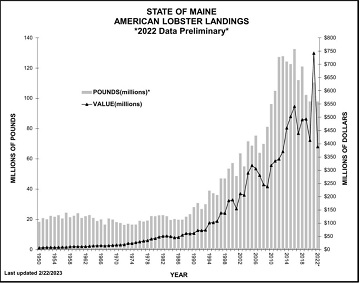
Lobstermen earn majority of commercial fishing haul
Maine’s commercial fishermen earned about half of what they did last year, according to preliminary data released on Tuesday by the state’s Department of Marine Resources (DMR). But while the total of $574 million pales in comparison to 2021’s historic high value of $907 million, it is in line with data from previous years. Maine’s lobstermen brought in the majority of that haul with 97,956,667 pounds, contributing $388,589,931 to the overall commercial harvest total. >click to read< 10:34
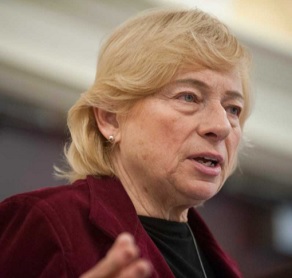
Many voices weigh in on offshore wind plan
Three days after Governor Janet Mills unveiled an offshore wind roadmap, a “comprehensive plan that offers detailed strategies” for offshore wind power in the Gulf of Maine, a handful of unconvinced citizens gathered at the Sustainable Maine Fishing Foundation Feb. 26 on Bar Harbor Road in Trenton. The idea was to inform lobstermen and interested people on offshore wind development before a Bureau of Ocean Energy Management (BOEM) presentation that opens the Fishermen’s Forum March 2 in Rockport, board member Ginny Olsen said. Energy operations consultant George Stover of Freeport, who has worked in the state’s energy industry for decades, discussed the Maine power grid and its energy sources and why, to his mind, offshore wind power is not a good fit or needed here. “If they continue down this road, it scares me,” he said. He is not alone. The idea of floating offshore wind installations in the Gulf of Maine has raised fears and concerns from environmentalists and fishermen alike. >click to read< 12:42

Lobstermen welcome reprieve on new federal fishing rules but wonder what comes next
The last-minute rider on the federal budget is an unexpected gift to lobstermen and the fishing industry, the kind that can’t be wrapped with a bow and placed under a holiday tree. But for some local lobstermen, the regulatory pause is just a pause, and one more link in the federal chain of regulations targeting lobstermen over right whale entanglements. But Hancock lobsterman and Zone B Council member Zachary Piper said he still gave a sigh of relief at the news.“I gave a sigh of relief, but there’s way more to come,” he continued. “Until they get science to figure out what’s going on and not hide behind an agenda, we’re going to be fighting the same things. This is just a relief from that.” >click to read< 07:46

Mills Directs DMR to Push for Expedited Appeal of Court Decision Hurting Maine’s Vital Lobster Industry
Governor Janet Mills directed the Maine Department of Marine Resources (DMR) to file a motion to expedite the appeal of a recent decision by the U.S. District Court for the District of Columbia in Maine Lobstermen’s Association v. National Marine Fisheries Service. The Mills Administration has partnered with the Maine Lobstermen’s Association in Maine Lobstermen’s Association v. National Marine Fisheries Service to assert that the National Marine Fisheries Service (NMFS) Biological Opinion, released in May 2021, is unlawful. The State and MLA argue that NMFS acted arbitrarily by failing to rely on the best available scientific information and by failing to account for the positive impact of costly conservation measures already adopted by the Maine lobster fishery. In its September 8, 2022 opinion, the U.S. District Court sided with NMFS against Maine lobstermen. >click to read< 11:06

On The Ropes – Federal court rules against lobster industry in appeal of whale protection regulations
“Obviously, it’s devastating to the lobster industry,” Stonington Town Manager Kathleen Billings told the Islander. Stonington lands by far the most lobsters in the state. In total, Maine lobstermen added an estimated $724,949,426 worth of lobster landings to the state commercial fishery in 2021. “We have a lot at stake,” Billings continued. “[Lobstering] makes up $60 [million] to $70 million to our economy and to have this recent ruling, and also too with the Seafood Watch list designation, they pretty much put a torch to our industry and burnt it to the ground for us.” >click to read< 08:55
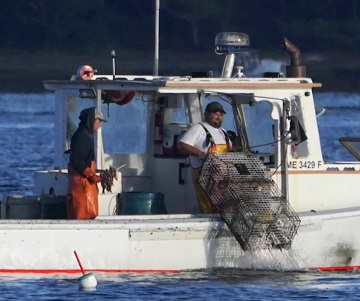
Lawmakers issue strong rebuke after con group adds lobster to ‘red list’
Seafood Watch, a conservation organization based at the Monterey Bay Aquarium in California, this week put North Atlantic lobster on its “red list” of seafood to avoid, as a hope to protect endangered species like the North Atlantic right whale. Since the announcement, lawmakers from both states, Maine and Massachusetts, have issued a strong rebuke against the conservation organization, coming to the defense of an industry they say is unfairly being targeted. Sen. Angus King, I-Maine., held a press conference with Maine’s Governor Janet Mills and joined a statement cosigned by Maine’s entire congressional delegation, calling the “red list” designation “reckless” and “irresponsible.” “Massachusetts Lobstermen know this issue, care about this issue, and have remained committed to doing their part despite regulations that entail major sacrifices by the industry,” Sen. Ed Markey, D-Mass. Video, >click to read< 09:50

Mills & Maine Congressional Delegation Respond to First Circuit Court’s Decision
Portland, Maine – Governor Janet Mills and U.S. Senators Susan Collins and Angus King and U.S. Representatives Chellie Pingree and Jared Golden issued the following statement today in response to the First Circuit Court of Appeals’ decision reinstating a ban on lobster fishing gear in nearly 1,000 square miles in the Gulf of Maine: “Once again, Maine’s lobstermen have been unfairly targeted by a misguided court decision. Today’s ruling fails to acknowledge the substantial steps that Maine’s lobster industry has already taken to comply with gear change rules to protect the North Atlantic Right Whale. We are deeply disappointed and will continue to strongly advocate for our state’s lobster industry.” >link<
Maine politicians blast ‘unfair’ court decision targeting lobster gear – A federal circuit court has reinstated a ban on lobster fishing gear in a nearly 1,000-square-mile area off New England to try to protect endangered whales. The U.S. District Court for the District of Maine issued a preliminary injunction to halt enforcement of the rules. The U.S. Court of Appeals for the First Circuit in Boston vacated that ruling Tuesday. >click to read< 11:09
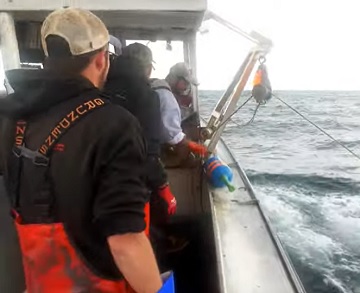
Save the Gulf of Maine – The Maine Reset, Ep. 4: Never Forgotten
Derek Colbeth grew up lobstering, and then served for 5 years in the US Marine Corps. Now he’s a civilian again, but his heritage and livelihood is under attack on all fronts. Powerful interests are converging in a war against Maine Lobstermen. If Lobstermen lose this fight, Maine will never be the same. >Video, click to watch< 14:35

Maine: 2021 Lobster Harvest the Most Valuable in the History of the Fishery
According to recently updated data from the Maine Department of Marine Resources, 2021 was the most valuable year in the history of Maine’s lobster fishery. At $724,949,426, the landed value for the iconic fishery jumped by 75 percent over 2020, by far the single largest increase in value, year over year. Of note, the increase in value from 2020 to 2021, $312,464,172, was more than the total landed value in 2009. “The Maine lobster industry remains a cornerstone of our states coastal economy and identity because of the uncompromising commitment to quality that follows every lobster, from trap to table,” said Governor Janet Mills. “I will continue to work tirelessly to support this vital Maine heritage industry.” >click to read< 17:09

Delegation, Mills Urge Commerce Secretary to Rescind Right Whale Rule and Protect Lobster Fishery
Following the U.S. District Court of Maine’s order blocking the Lobster Management Area (LMA) 1 restricted area closure, which is a component of the National Marine Fisheries Service’s flawed and unfair Atlantic Large Whale Take Reduction Rule, U.S. Senators Susan Collins and Angus King, Representatives Chellie Pingree and Jared Golden, and Governor Janet Mills sent a letter to Commerce Secretary Gina Raimondo. In their bipartisan letter, the Maine Delegation and Governor Mills applauded the U.S. District Court of Maine’s decision halting the enforcement of the LMA 1 closure and urged Secretary Raimondo to use her authorities to immediately resolve the rule’s many shortcomings. >click to read< 09:16

Mills Administration Granted Intervenor Status to Support Maine’s Lobster Industry in Lawsuit
Governor Janet Mills announced today that a federal judge has granted her Administration’s motion to intervene in the pending litigation Center for Biological Diversity v. Ross in the U.S. District Court in the D.C. Circuit. “Intervening in this case is a critically important step in the state’s efforts to support Maine’s vital lobster industry,” said Governor Mills. “A court decision in the plaintiff’s favor could close Maine’s lobster fishery altogether – a completely unacceptable outcome that would be devastating to our lobstermen and their families and devastating to our coastal communities and our economy. We will fight tooth and nail to prevent that from happening.” >click to read< 07:09

Delay Implementation of Gear Marking & Modification in Right Whale Rule
In a letter today to Secretary of Commerce Gina Raimondo, Governor Janet Mills urged swift action by NOAA Fisheries to reduce the unnecessary economic harm to Maine fishermen that the recently announced Federal whale protection rule will cause. “I don’t believe this rule, as written, should take effect at all, and, at the very least, I urge you to direct NOAA Fisheries to delay the rule’s implementation of gear marking and gear modifications (including both trawling up and insertion of weak points) to July 1, 2022,” wrote Governor Mills. “It is entirely unfair that Maine lobstermen continue to be the primary target of burdensome regulations, despite the many effective mitigation measures they have taken and despite the data showing that ship strikes and Canadian fishing gear continue to pose significant risk to right whales,” >click to read< 14:38

Maine Fishermen slow offshore wind farm development – Keep Fighting
Actions by Maine fishermen directly affected the process of offshore wind development in the Gulf of Maine with a bill signed into law on July 7 by Governor Janet Mills. The measure was a response to plans that surfaced last year for a 16-square-mile, 12-turbine wind farm, called a “research array,” off the southern coast of Maine. Proponents promised good jobs and cheap, green electricity. Fishermen weren’t so sure. They envisioned wind farms springing up throughout the Gulf of Maine, harming marine life and damaging coastal communities. “We as fishermen work and take care of the water,” said Virginia Olsen, a Maine Lobstering Union director who lives in Stonington. “We feel these things will get dumped on the water and then someone will say, ‘Just leave them there, it’ll be a coral reef.’ But it will just be trash left for us.” >click to read< 16:55
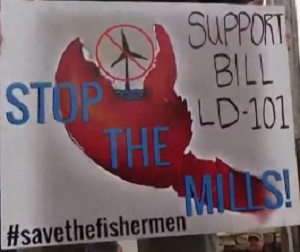
Lobstermen united against Monhegan offshore wind project
In one of Maine’s biggest lobster harbors, close to 100 fishermen and their supporters packed the town dock to stand, side by side, in opposition to offshore wind power development in the Gulf of Maine. For the fishermen, the events of the week have hardened their resolve to fight the wind turbine project, which they say will be just the beginning of more platforms being installed in years ahead. They insist the development will damage the Gulf of Maine, “It’s not about anti-wind, it’s not about anti-green,” said Friendship wharf owner Jim Wotton. “It’s about preserving the Gulf of Maine.” Video, >click to read< 12:21
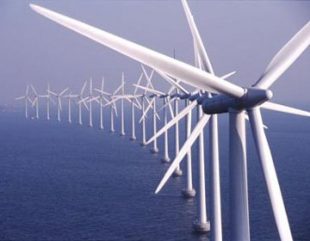
Offshore wind project raises questions for lobstermen
A Gulf of Maine offshore wind power initiative Maine Governor Janet Mills rolled out late last year has raised concern in the lobster fishing community,,, Mills has said the Governor’s Energy Office should “work closely with Maine’s commercial fishing industry,,, The Maine Lobstermen’s Association agrees collaboration is necessary. Maine is also taking part in a federally led task force on offshore wind with New Hampshire and Massachusetts. Named the Gulf of Maine Intergovernmental Regional, >click to read< 19:45

Governor Mills Urges Commerce Secretary Ross to Reject Pew Charitable Trusts prohibition petition
Standing up for Maine’s vital lobster industry and its hardworking men and women, Governor Janet Mills today urged U.S. Secretary of Commerce Wilbur Ross to deny a petition by Pew Charitable Trusts that would prohibit the use of vertical lines in the American lobster and Jonah crab fisheries in four areas of the New England coast. In a letter sent to the Commerce Secretary yesterday, Governor Mills explained that the petition, which asks for immediate year-round closures south of Martha’s Vineyard and Nantucket and three seasonal offshore closures in the Gulf of Maine to protect North Atlantic right whales, “not only fails to provide additional protections for right whales, but contrary to Pew’s assertions, it will also cause significant economic impact to Maine’s iconic lobster fishery.” >click to read< 17:03
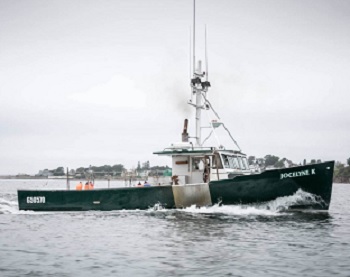
I’m a Maine lobsterman. I leave a lot of my life up to chance. But I don’t know if I can handle this level of uncertainty.
Herman Coombs is a lobster fisherman in Orrs Island, Maine. He’s been fishing since elementary school, he says, and went full-time after high school. In all those years, he can think of two times when the price of lobster has been any lower—in 2001, in the weeks after 9/11, and during the Great Recession. With restaurants in Portland and Lewiston—Maine’s largest cities—still closed for dine-in seating, and the state’s crucial tourism industry sure to take a massive hit this summer, he’s worried. “Right now, we’re only hauling about once every two weeks. That’s because of the weather. We’re getting a lot of wind in the afternoons, which ends up being pretty gusty, and isn’t a lot of fun. And the prices.,, >click to read< 11:19

Coronavirus: Gov. Mills asks President Trump for direct financial assistance in support of Maine’s fishing and seafood industries
Governor Janet Mills pressed President Donald Trump to marshal the resources of the federal government to support Maine’s vital fishing and seafood industries. “I am writing today to ask for your immediate assistance in support of Maine’s iconic seafood industry. The COVID-19 pandemic is taking a substantial toll on Maine’s independent fishermen, aquaculturists, wholesale dealers, and seafood processors,” wrote Governor Mills. “The markets for their products are collapsing both globally and locally. The men and women who ply our waters harvesting lobster, groundfish, herring, shellfish, countless other species, and farming aquacultured products are the very backbone of our rural coastal economy.” >click to read< 15:19

“This is our line in the sand,”: Facing new threats, lobstermen take hard line against right whale protections
“My administration will not allow any bureaucrat to undermine our lobster industry or our economy with foolish, unsupported, and ill-advised regulations,” Governor Janet Mills told a crowd of cheering lobstermen at a protest this summer at a protest this summer in Stonington. The backlash started shortly after a government-appointed team of scientists, fishermen, and others urged the agency to require lobstermen to reduce their buoy lines, among other measures.,, But with increasingly vocal protests across Maine’s rugged coast from rank-and-file lobstermen, the state’s leaders — including their entire congressional delegation,,, >click to read< 12:17
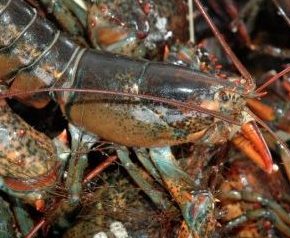
DMR’s answer to whale rules focus offshore
Last week, DMR Commissioner Patrick Keliher announced that after “rigorous scientific analysis,” the department had come up with a new draft plan to address “both the risk to right whales and concerns of fishermen” that is “in keeping with the real risk the Maine fishery presents.” Last March, the National Marine Fisheries Service announced that the risk of injuries to right whales in the Gulf of Maine had to be reduced by at least 60 percent. Last March, the National Marine Fisheries Service announced that the risk of injuries to right whales in the Gulf of Maine had to be reduced by at least 60 percent.,,, The rule also would extend electronic vessel monitoring now required on boats that hold permits to fish for species other than lobster in federal waters to all federally permitted lobster boats. >click to read< 11:27
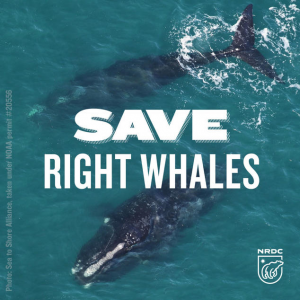
Are the ENGO’s pushing propaganda to pressure your Representatives and sway the public against you?
From the article: What evidence is there that Maine contributes towards right whale entanglement? The Maine congressional delegation has also suggested that the state’s fisheries do not contribute to right whale entanglements. Yet, Maine has almost three million licensed traps and logic dictates the high density of vertical lines associated with those traps poses a significant risk of entanglement. An encounter between a whale and even a single vertical line can result in a deadly entanglement. >click to read< Who supports these ENGO’s, anyway!

Marine Resources Committee open for business, sets Keliher confirmation hearing
The Marine Resources Committee has new co-chairs, Sen. Dave Miramant (D-Knox County) and Rep. Joyce McCreight (D-Harpswell), and will hold its first hearings this week. First out of the gate at the Marine Resources Committee is LD 4 — “An Act To Encourage Applied Shellfish Research” — sponsored by Rep. Robert Alley (D-Beals) and scheduled for a hearing at 1 p.m. on Thursday Jan. 24. >click to read<14:46






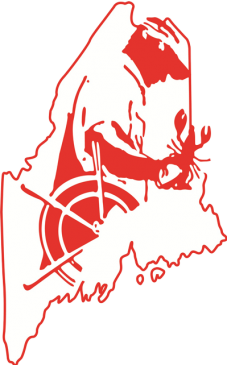



























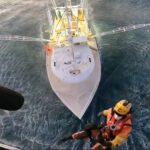




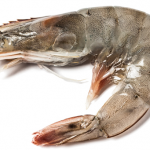
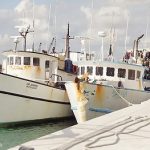
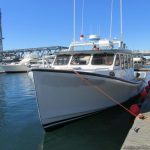
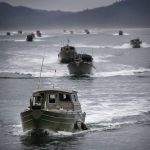
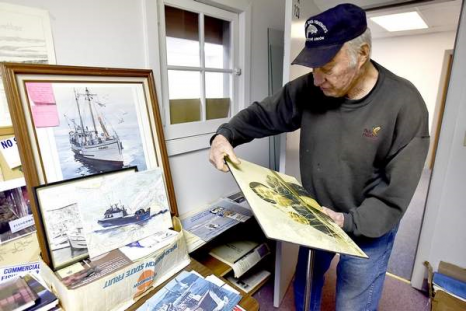




Fishermen submit hundreds of comments on leasing Gulf of Maine for offshore wind
During the 33-day comment period, BOEM held six online meetings Nov. 1-3 to discuss the draft areas and three proposed secondary areas not included in the draft, and to answer questions and hear feedback from specific stakeholder groups, such as commercial and recreational fishermen, environmental nonprofits and the shipping and transportation sector. So, what did everyone have to say? When it comes to commercial fisheries, gaps in the data that inform where WEAs will least conflict with fishing remain a top concern, as do the cables running the power to shore. Also of concern are certain quadrants included in the draft WEAs, which some at the meetings said are spawning areas for haddock and redfish. more, >>click to read<< 08:27
Share this post